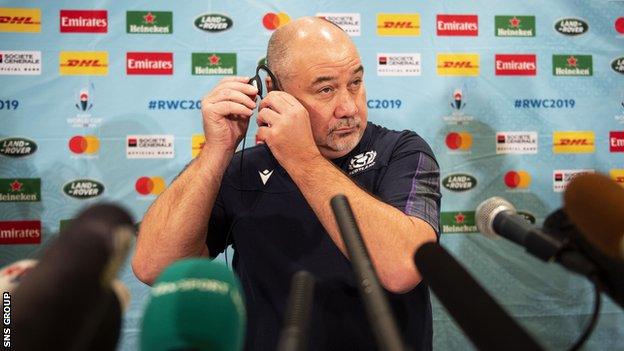Mark Dodson: Scottish Rugby chief says CVC cash 'massive help' in tough times
- Published

Dodson says CVC will bring a 'clear focus' to the commercial operation of the Pro14
When you're in the midst of a global pandemic that threatens to obliterate your sport the appearance of "north of £20m" of new money is a sight for sore eyes.
That's Scottish Rugby's cut of a significant deal that was announced on Friday. After protracted negotiations with CVC Capital Partners, one of the largest private equity and investment firms in the world, the PRO14 will part with 28% of its business in exchange for around £120m over three years, to be divided between the unions in Scotland, Ireland, Wales and Italy.
Having already taken on 27% of the English rugby Premiership CVC have now made a second move in the market while still pursing a 15% stake in the Six Nations. Co-founded and co-chaired by Donald MacKenzie, a Scot with a law degree from Dundee University and a passion for Formula 1, they've become a global financial powerhouse that manages £67bn in assets.
Mark Dodson, the chief executive of Scottish Rugby, said that the first tranche of cash is due "almost immediately" and rather than being spent imminently it will be safeguarded.
"It will be ring-fenced in an account. We're not going to rush to spend this money. We're going to make sure it sits in our balance sheet and supports the work we're doing to look at the impact that COVID-19 is having on our business.
"This is really, really welcome news in a very difficult time. This money helps. It's not the cure, but it's a massive help in terms of confidence and cash."
Like most professional sports, the rugby landscape is a bleak one right now. Dodson is making no predictions about when we'll see games in front of crowds - or even games behind closed doors - because there remains little clarity. In Ireland, it looks like their four provinces will be back playing games against each other - no fans allowed - in late August, but that's not the scenario in Scotland.
Dodson has already forecasted that if Scotland's three autumn Tests against Argentina, Japan and New Zealand have to be cancelled then it comes at a cost of £12m. "That's a conservative figure," he said on Friday.
The chief executive went further when asked about comments made by Philip Browne, his counterpart at the Irish Rugby Football Union. Browne said that he expects the IRFU's cash reserves to be exhausted in a matter of months.
"We're all in the same position," said Dodson. 'We're all part of the same ecology. Our revenue streams were switched off pretty quickly. If we don't get the autumn Tests away and if it goes into the Six Nations next year and we lose those [three home] games [against Ireland, Wales and Italy] then we're into the territory of £40m-plus losses and that's when we find ourselves in a very different position.
"I can assure you of this, we're working night and day to get ourselves across this. We'll act sensibly by ring-fencing this money from CVC."
Little is really known about CVC's motivations in investing in rugby, but their first foray into sport tells us something about their modus operandi. From 2006-2017 they owned a majority stake in Formula 1, for which they paid £1.4bn. CVC's pursuit of profit at every turn saw the sport disappear from free-to-air television.
The money in the sport increased hugely but the audiences dwindled rapidly. Their involvement was both lucrative and controversial.
They don't have a majority stake in the Pro14 so will not lord it over the game as they did F1, but their gameplan is still a mystery. CVC have 550 employees in 24 offices across Europe, Asia and the US, but trying to get any of their many serious operators to talk openly to the media about their plans for rugby has proven an impossible task so far.
"We've got to know these guys very well in the last few years," said Dodson. "They intend to be long-term supporters of the sport. I think they'll bring a clear focus on the commercial side.
"I don't think they have any interest in the sporting side, they don't want to be involved in rules and regulations. They're much more interested in the commerce."
Their money is welcome in these straitened times. The influence they may wish to wield on the back of it remains uncertain.